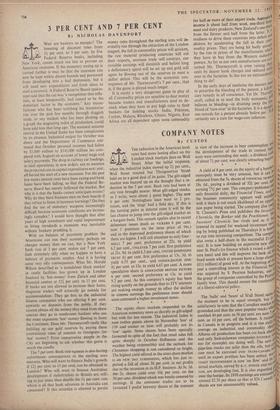3 PER CENT AND 7 PER CENT
By NICHOLAS
DAVENPORT
WHY are bankers so. myopic? The lowering of discount rates from
31 per cent. to 3 per cent. by five Federal Reserve banks, including New York, comes much too late to prevent an American recession. If the monetary easing up is carried farther it may be that the recession can
now be kept within decent bounds and prevented from developing into a bad depression, but it ' will need new expenditures and fresh ideas to start a recovery. A Federal Reserve Board spokes-
man said that the cut was 'a recognition that infla- tion, at least temporarily, had ceased to be the dominant factor in the economy.' Any manu- facturer who has been watching his inventories rise over the past few months through sluggish trade, or any student who has been plotting on a graph the stagnating index of production, could have told him that long ago. The seasonal autumn revival in the United States has been conspicuous by its absence. Industrial output for October was down and the Department of Commerce esti- mated that October personal incomes had fallen by $1,800 million to $345,000 million (as com- pared with August) on account of lower wage and salary payments. The drop in railway car loadings, in steel operations, in new orders, not to mention the projected cuts in capital expenditures next year, all herald the start of a new recession. For the past few weeks interest rates have been easing and bank loans 'have' been falling, so that the Federal Re- serve Board has merely followed the market. But why is it that the banks cannot anticipate events? Why do they have business men on their boards if they refuse to listen to business warnings? Do they find the use of monetary weapons increasingly difficult because economic conditions are increas- ingly complex? I would have thought that after years of high investment and rapid improvement in living standards a recession was inevitable without bankers prodding it.
With no balance of payments problem the Americans can run their economy perhaps on cheaper money than we can, but a New York bank rate of 3 per cent. makes our 7 per cent. look extremely silly when we happen to have a balance of payments surplus. And it is having some very silly consequences. What Mr. Harold Wilson described as 'a scandalous black market' in credit facilities has grown up in London financed by 'hot money' from Zurich and other financial centres at 12.f per cent. to 15 per cent. If banks are not allowed to increase their loans, desperate traders will naturally go outside for accommodation. They go first to the industrial finance companies who are offering 8 per cent. upwards ,on deposits from the public. If they cannot obtain all the money they need from these sources they go to mushroom bankers who use the more expensive 'hot' money flowing in from the Continent. Does Mr. Thorneycroft really like building up our gold reserves by paying these extortionate rates of interest to foreigners for 'hot' money? Even conservative people in the City arc beginning to ask whether this game is worth the candle.
The 7 per cent. Bank rate squeeze is also having unfortunate consequences in the sterling area overseas. Who will want to finance India's growth if 121 per cent. to 15 per cent. can be obtained in London? Who will want to finance Australian development if industrialists in Britain are will-. ing to pay more than double the 51 per cent. rate which is all that bank advances in Australia cart command? If this situation is allowed to persist money rates throughout the sterling area will in- evitably rise through the attraction of the London magnet, the fall in commodity prices will quicken, the raw material producing countries will cut their imports, overseas trade will contract, our invisible earnings will diminish and before long a deflationary spiral will be set up and gold will again be flowing out of the reserves to meet a dollar deficit. This will be the economic con- sequence of Mr. Thorneycroft's 7 per cent., that is, if the game is played much longer.
It is surely a very dangerous game to play at all. Commodity prices are sensitive to dear money because traders and manufacturers tend to de- stock when they have to pay high rates to their bankers for holding stocks. India, Pakistan, Ceylon, Malaya, Rhodesia, Ghana, Nigeria, East Africa are all dependent upon some commodity
for half or more of their export trade. Australia's income is about half from wool, one-third froni, meat and dairy products; New Zealand's one-thira from the former and half from the latter. It i5, madness to drive these countries into deficit an -distress by accelerating the fall in their corn' modity prices. They are being hit badly enough by the rise in prices of the manufactures wind; they have to buy from the Western industrial powers. As far as our own manufactures are car!' cerned Mr. Thorneycroft is even raising their costs by dearer bank charges and reduced turn' over in the factories. Is this not an extraordinary thing to do? In the early days of medicine the doctors used to prescribe the bleeding of the patient, a kill-or. cure remedy in all conscience. Yet Dr. Thorne''' croft, called in to tend the body economic, still believes in bleeding—in draining away the life. blood of 'turn-over' in the factories. It is a danger.' ous remedy for a patient already 'below par.' It I5 certainly not a cure for wage-cost inflation.










































































 Previous page
Previous page